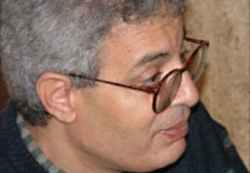Poetry does not begin in a vacuum. It is not based on emptiness, and does not go into nothingness. Poetry is a world with its geography and history, just as it has its past, present and future.
Rather, the poet’s role is based on living in those spaces for poetry, a day or a part of the day, and taking us with him to live his moments in that rich and exciting world.
Thanking PAWA for choosing me as one of the judges of the Arab Poetry Prize in Africa, I thank all the poets who participated, with more than 80 books that took me to the worlds of imagination, from the East to the West, along the orbit of the Arabic alphabet.
My question while I was reading was not about generations, nor about countries, nor about form.
Did the book take me to its world? Did imagination work succeed doing that? Did its language successfully complete the task?
Poetry is transient to all of this, so among the names I nominated in the short list of 15 poets, there were poets and poetesses among young and old, in more than ten countries, some of them write traditional vertical poetry, and others choose the pattern lines of verse, while the rest directed their faces towards free verse, or prose verse.
I was searching in the poem for the essence of poetry. I perhaps lived a similar experience months ago when I was chosen a jury member at the Kazan International Film Festival. I found myself with a film for up to two hours to write an evaluation so that we could choose the winners.
This is how I did, and I dealt with books in the same way, asking myself and my taste after reading the work of each contestant: Did the book take me to its world? Did imagination work succeed doing that? Did its language successfully complete the task?
And I saw that these names did this successfully: Abdel Moneim Ramadan (Wandering in the Wilderness), Huda Hussein (From a Balcony Parallel to the Train), Fares Kbeish (No One Leaves His Shadow in the Desert), Hamid Bakhit (Secrets of Exit), and Mahmoud Al-Absi (The Sweat of the Heart), Miftah Al-Amari (Sticks Game for the Residents of the Wind), Nuseiba Atta Allah (Waiting for Godot), Youssef Al-Azraq (Kept in a Cool Place), Abdul Qadir Mahdawi (Autumn Al Violins), Ahmed Anis (From the Grandparents’ Balcony), Muhammad Ismail (Cactuses Alphabet), Bakhti Dhaif Allah (ًWhat the Butterfly Did Not Say), Radwan Al-Ajroudi (Happiness Disappears in the Mirror), Rafiq Jalloul (An Apple that Did Not Fall on a Bedouin’s Head), and Reda Ahmed (Confession is a Common Mistake).
But winning a prize, with this amount of participation, and the presence of another judge with different taste and consensus, made me and the poet Professor Fatima Bouhraka nominate only five names together, to be the ones we announce their names today: Abdel Moneim Ramadan, from Egypt, and Mohamed Najib from Sudan, the two crowned with prize for poetry, as if the Arab-African poetry in the north and south of the River Nile had made the waters of the poem more sweet, endowing poetry with vitality and flow.
The poet Abdel Moneim Ramadan created an entire imaginary world, with creative vocabulary in the form of new prose poetry, as Muhammad Naguib presented in the form of modern poetry, and his strong poems that overflowed with pain, despite the despair between its lines.


